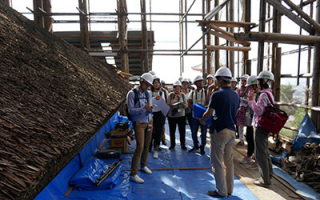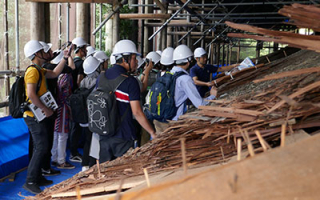Organisers
This course is jointly organized by the Agency for Cultural Affairs, Japan (Bunkacho); Asia-Pacific Cultural Centre for UNESCO (ACCU); International Centre for the Study of the Preservation and Restoration of Cultural Property (ICCROM); and National Research Institute for Cultural Properties [Tokyo and Nara], in cooperation with the Japanese Association for Conservation of Architectural Monuments (JACAM); Japan Consortium for International Cooperation in Cultural Heritage (JCIC-Heritage); under the auspices of Japanese National Commission for UNESCO; Nara Prefectural Government; and Nara City Government.
Background
In the Asia and Pacific region, there are various forms of cultural heritage which are of great value from a global point of view. In order to safeguard this important heritage for future generations, it is necessary to train heritage professionals for proper investigation, analysis and conservation. ACCU Nara, in partnership with ICCROM and Bunkacho, has been organizing training courses since 2000 on specific themes with a view to building the capacity of professionals involved with cultural heritage protection in the region. The curriculum of the 20th group training course is designed for young professionals and comprises comprehensive basic knowledge and techniques in the fields of investigation, conservation and management of wooden structures.
Objectives
The objectives of this course are to provide participants with:
- knowledge of skills-based techniques for the documentation and analysis of wooden structures;
- knowledge of skills-based techniques for the repair/restoration of wooden structures;
- knowledge of principles and methodologies for the conservation of wooden structures;
- knowledge of disaster risk management for cultural heritage;
- opportunities to share their knowledge and experience of heritage protection and to build networks among heritage practitioners in the region.
Course Curriculum
The course curriculum is designed so that participants are able to learn an overview of the process of investigation, restoration and conservation of wooden structures in Japan. The experts from ICCROM will deliver the lecture on international principles and methodologies for heritage conservation. The course is divided into five interconnected units following the procedure of conservation practice. It includes classroom lectures, work sessions, on-site studies and presentations and discussions. (Please refer to the tentative course schedule.)
Units:
1. Current Issues and Global Perspective on Conservation of Wooden Structures
2. Protection Systems for Cultural Heritage in Japan
3. Documentation of Wooden Structures
4. Restoration of Wooden Structures
5. Management of Wooden Structures
Contents
Classroom lectures
- Current situation and issues of architectural conservation in the Asia-Pacific region
- Disaster risk management for cultural heritage
- Protection systems for cultural heritage in Japan
- Case studies of conservation and restoration of wooden structures in Japan
Work Sessions
- Documentation of wooden structures (measured drawing, photography)
- Damage/deterioration investigation of wooden structures
On-site Studies
- Restoration sites of wooden structures
- Case studies of conservation of historic towns
Presentations and Discussions
- Country report presentations by participants
- Community-centred management of historic towns (discussion with local people)
- Plenary discussions
Working Language
English (with consecutive interpretation from Japanese)
Criteria for Selecting the Participants
The training course is offered to heritage practitioners from the following 42 signatory countries to the UNESCO World Heritage Convention in the Asia and Pacific region, who are recommended by the National Commissions for UNESCO (NATCOM)*. The maximum number of participants is 15 (one participant per nation, in principle).
*National Commissions for UNESCO are national cooperative bodies operating for the purpose of associating their governmental and non-governmental bodies in education, sciences, culture and communication with the work of the organization. They are set up by their respective governments in accordance with the Article VII of the UNESCO Constitution.
Signatory countries:
Afghanistan, Australia, Bangladesh, Bhutan, Brunei Darussalam, Cambodia, China, Cook Islands, Fiji, India, Indonesia, Iran, Kazakhstan, Kiribati, Kyrgyz Republic, Lao P.D.R., Malaysia, Maldives, Marshall Islands, Micronesia, Mongolia, Myanmar, Nepal, New Zealand, Niue, Pakistan, Palau, Papua New Guinea, Philippines, Republic of Korea, Samoa, Singapore, Solomon Islands, Sri Lanka, Tajikistan, Thailand, Timor-Leste, Tonga, Turkmenistan, Uzbekistan, Vanuatu and Viet Nam.
Participants should be:
- young heritage professionals who are expected to have 5-7 years' experience in the field of conservation and management of wooden structures, to be currently involved in the conservation practice at heritage sites, and to be able to make effective use of the outcome of the training after returning to their respective countries;
- those who have a good command of English; (each participant will be asked to deliver presentations and write reports in English)
- those who are in good health enough to attend the entire training programme;
- those who will continue to interact and exchange information with ACCU after returning to their home countries;
- those who have not previously participated in the ACCU group training course under the theme ‘Preservation and Restoration of Wooden Structures’.
Application Requirements
- Application form [Form 1] [Guideline for Application Form] Please attach a copy of the passport, if the applicant has a valid passport at the time of application. This is not necessary if the applicant has not yet to obtain a passport.
- Letter of recommendation from the institution of the applicant [Form 2]
- Short paper (2 pages) [Form 3] It will weigh heavily in the selection of participants. This paper should be written by the applicant and describe:
- the reason for applying;
- a brief summary of the applicant’s work related to the conservation of wooden structures;
- future plans to utilize and develop the outcome of the training course in the applicant’s country.
- Letter of recommendation from UNESCO National Commission (NATCOM). Since the organizer will send the course announcement to NATCOM in respective countries and request to recommend some candidates, please contact them directly for any inquiries.
- Certificate of English proficiency. It can serve as a reference for the screening. There is no need to attach this if applicants do not have one at present.
Only complete applications with all necessary documents are eligible for consideration. Letters of recommendation from the institution and NATCOM should be physically signed and stamped and uploaded as a scanned copy. It will be appreciated if the application sheet can be sent in both Word and PDF formats.
The organizer will reply to the applicant who sends the documents above directly to us. In case he/she will not receive the confirmation of receipt in a week, please contact us immediately.
Notification of Screening Results
After consideration in consultation with the co-organizers, the organizer will select 15 people (one participant per nation, in principle) from among all applicants. We will inform successful candidates and each National Commission for UNESCO of the result in early July.
Final selection would be made through telephonic interview. The dates for the interview will be informed later.
Certificate
A certificate of completion will be awarded to participants who satisfactorily attend all course activities and make a final presentation.
Course Costs
The organizer will cover the costs during the training course as follows:
- Round-trip travel cost
The flight tickets between the nearest international airport to participants’ residence and Nara will be arranged and provided by the organiser. Those from Australia, Brunei, China, New Zealand, Republic of Korea and Singapore are expected to cover their round-trip travel cost and arrange the tickets to and from Kansai International Airport. The organizer will arrange the transportation between the airport and Nara city. - Daily allowance
All of the participants shall, in principle, be provided the basic living expenses incurred during the training course according to ACCU Nara’s regulations. - Accommodation
A room for single occupancy at the hotel in Nara city will be provided during the course for all the participants. In case the accommodation on the way to and/or from Japan for any unavoidable reason (such as visa application or limited flight connections) is needed, the organizer will make an arrangement and cover its expense.
Participants shall be responsible for visa application fees and domestic travel expenses.
Secretariat
Cultural Heritage Protection Cooperation Office,
Asia-Pacific Cultural Centre for UNESCO (ACCU)
Nara Pref. Nara General Office, 757 Horen-cho, Nara 630-8113 JAPAN
Tel:+81-(0)742-20-5001
Fax:+81-(0)742-20-5701
E-mail: nara@accu.or.jp


